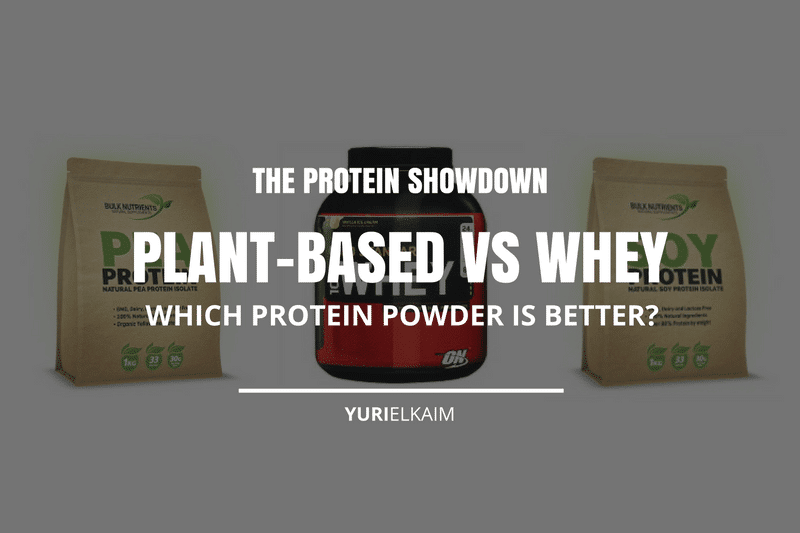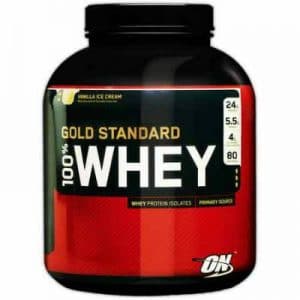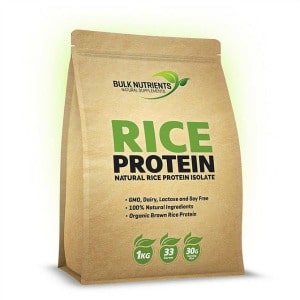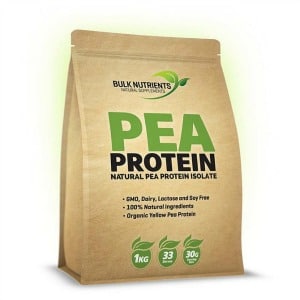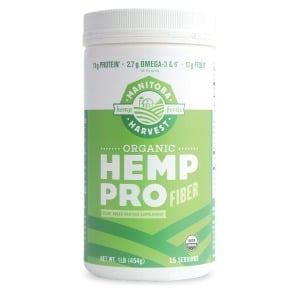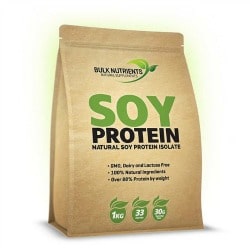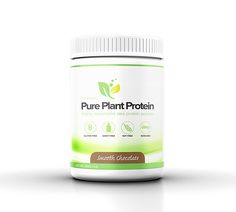In this article
These days, it’s nearly impossible to walk into a fitness center without seeing gym goers using some kind of protein supplement – whether it’s a shake or bar.
Even those who don’t go to the gym use protein powder for everything from smoothies to chocolate chia pudding parfaits to peanut butter cups as a quick way to bump up the amount of protein they get every day.
But take a quick trip down the supplement aisle and you’ll likely be left scratching your head. With so many different types of protein powders available, it’s hard to know which one to choose.
The two big-hitters when it comes to protein powders are plant-based protein and whey protein.
What’s the difference between whey protein and vegan protein? Which one will give you a boost of nutrition without unwanted negative side effects?
Let’s find out.
Plant Based Protein vs. Whey
First, let’s talk about whey protein, which is one of two proteins that comes from milk.
During the cheese-making process, cheese curds are separated from the liquid parts of milk. This watery byproduct is known as whey and – you guessed it – it’s the kind of protein that is used to produce whey protein.
You might also have heard of casein, the other form of milk protein, which constitutes about 80 percent of milk protein.
Of the two, whey is the more popular protein supplement choice because it’s absorbed faster and can increase protein synthesis. Plus, allergies and sensitivities to casein are more common than they are to whey protein (1).
That being said, whey protein has its share of drawbacks.
Allergies, Gas, and More
The number of people with milk sensitivities has steadily increased over the years, to the point where milk tops the list of allergies among kids (2).
Many people don’t even know they’re sensitive to whey protein – they notice the symptoms without attributing the cause.
Gas, bloating, flatulence, and excess mucus production can all result from milk protein intolerance. And they are sure signs that you shouldn’t be consuming milk products.
Plus, with a whopping 75 percent of the global population being affected by lactose intolerance, any unintentional cross-contamination can trigger a bunch of unpleasant symptoms and make it even harder to digest (3).
And unless you’re getting your whey protein from high-quality and organic sources, there’s a pretty good chance you’ll be ingesting some nasty hormones and toxins.
Not ideal.
You can see why whey might not be the best option if you’re looking for the best health-promoting protein powder.
In fact, when it comes to plant protein powder vs whey, I recommend sticking to plant-based, dairy-free protein powders whenever possible.
Plant-Based Protein Primer
But not all plant protein powders are created equal. Let’s look at a few of the most common types to help determine which one is the best fit for you.
1. Brown Rice Protein Powder
Brown rice, although though mostly made up of carbohydrates, contains a small amount of protein that is used to produce brown rice protein.
A scoop of brown rice protein typically contains about 24 grams of protein, putting it right on par with other protein powder varieties. It also contains a good chunk of iron, phosphorus, and fiber.
Brown rice protein is an excellent alternative to whey protein if you have food allergies or sensitivities. It is hypoallergenic and much more easily digested than whey protein, making it a great option when it comes to plant-based proteins.
The downside? Rice protein is not a complete protein, meaning it needs to be paired with other plant-based protein sources to ensure an adequate amount of all nine essential amino acids.
Combine it with some of the other plant-based protein powders below to get the optimal blend of amino acids.
2. Pea Protein Powder
Pea protein stands out as one of the best plant-based sources of protein. It’s high in protein and amino acids that promote prime performance.
Pea protein is an especially good source of arginine and lysine.
Arginine is necessary for wound healing, muscle preservation, and the regulation of blood pressure. Lysine, meanwhile, is an essential amino acid that is often missing from vegetarian and vegan diets. It keeps cholesterol levels low, helps convert fatty acids into energy, and stimulates collagen formation.
On top of being easily digested, pea protein has a smooth and fluffy texture that’s ideal for using in protein shakes.
Like most other plant-based proteins, it’s important to use pea protein powder with another source of protein to provide your body with the nine essential amino acids it needs.
Mixing a scoop of pea protein powder with some hemp seeds, chia seeds, or flax seeds can bump up your protein intake and create a complete protein.
3. Hemp Protein Powder
Hemp protein is a popular protein powder choice for those on a vegan diet.
Produced from high-protein, nutrient-rich hemp seeds, hemp protein is a near-complete protein and contains most of the amino acids that our body is unable to produce on its own.
Bonus: hemp is also full of heart-healthy fats, boasting a great balance of omega 3 and omega 6 fatty acids. Not only does this help boost cardiovascular health and cholesterol levels, it also eases inflammation.
Hemp protein powder also contains a hearty dose of magnesium, calcium, potassium, and iron.
Hemp should be consumed in conjunction with other protein sources, as it is limited in lysine. Pairing it with another type of protein can help ensure that your body is getting all of the necessary types of protein to support proper health.
4. Soy Protein Powder
Soy protein comes from soybeans that have been dehulled, defatted, and then processed. Over the years it’s become a huge part of our food supply, and is now found in everything from breakfast cereals to store-bought salad dressings.
Soy protein powder can be a good alternative to whey protein for vegans or those with allergies, especially because it’s a complete protein. This means that it contains all of the essential amino acids that our body needs to support muscle building, growth, and recovery.
That being said, excess soy consumption is not ideal, as it has been linked to an increased risk of breast cancer in women who have a history of estrogen-positive cancer.
The Susan G. Komen foundation notes that soy protein isolates can actually increase cancer growth, and recommends against soy supplements altogether (4).
Plus the phytoestrogens found in soy products have been shown to increase estrogen levels in the body. This can lead to “estrogen dominance” and problems like ovarian cysts, weight gain, and endometriosis.
Not only that but, according to the USDA, an astonishing 94 percent of soybean plants grown in the United States are actually GMOs (genetically modified organisms), putting you at risk for developing allergies, antibiotic resistance, and toxicity (5).
5. Fermented Pea Protein Powder
This type of protein powder has all the benefits of pea protein powder, but it’s fermented to enhance your body’s ability to digest it.
To make fermented pea protein powder, peas are fermented and carbohydrates are slowly broken down, making it even easier for the body to absorb its nutrients.
As you know, fermented foods help populate your body with probiotics, This keeps the gut healthy, filling it with good bacteria that support a functional microbiome, a strong metabolism, healthy digestion, and overall health in general.
Fermented pea protein contains a complete amino acid profile that can cut down on cravings and keep you feeling full. It also helps jumpstart your metabolism, enhancing your calorie-burning capabilities. Sounds pretty good, right?
With fermented pea protein powder, you’re getting all the protein, increased absorbability, and beneficial amino acids that you find in pea protein, with the benefits amplified through the fermentation process.
Pursuit of the Perfect Protein Powder
Protein powder can be an awesome tool to help meet your needs, especially if you’re short on time or looking for something that will quickly ramp up your daily protein intake.
The quality and source should always be taken into consideration, though, and not all protein powders will work for everyone.
When comparing plant based protein vs whey, it’s clear that plant based powders are likely a better fit for most people.
You’re less likely to experience undesirable symptoms when using a plant based protein powder than you are with whey. That’s because plant-based proteins are easier to digest and absorb, which means you’ll get the most nutrients possible.
Next time you’re deciding which protein powder you want to add into your diet, remember that you have plenty of options. Give plant-based protein a shot — your body will thank you.
How Much Do You Know About Protein?
Learn the secrets they don’t want you to know about protein. Take the quiz!
Click the banner right now to find out how much you know.

